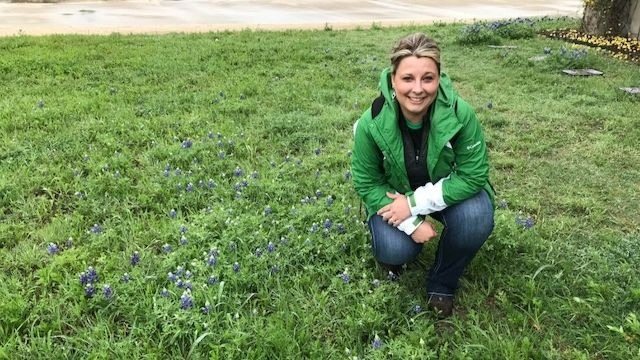Farmer’s Guide to Trucking Regulations available to Ohio Farm Bureau members
The guide includes a farm driver checklist, overview of state and federal regulations and exemptions, CDL qualifications and more.
Read More
March 26-28, I had the incredible opportunity to participate in the American Farm Bureau Foundation for Agriculture’s On the Farm STEM event for educators. The event was also sponsored by the Beef Checkoff program. After an an application period back in December, I was excited to learn I was selected to participate in the Fort Worth, Texas event given my background growing up on a small family farm and now working as a 4-H Extension Educator in Fairfield County for Ohio State University Extension.
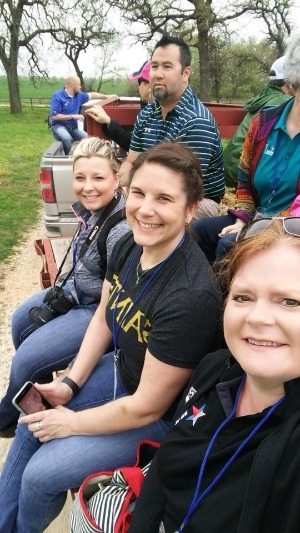
My perception of this opportunity was for school teachers who had little to no experience with agriculture or farming. However, attendees were a great mix of Extension professionals, Farm Bureau professionals, non-formal agricultural educators, agricultural education teachers, STEM coordinators and educators, and school teachers of all grades. What a neat experience to network with such a range of educators as we were immersed in Texas agriculture focusing on the beef industry. We learned from one another and helped bridge the gap in agricultural literacy by having conversations about educational objectives and standards in connection to the beef industry and STEM concepts.
The schedule planned for us was condensed with numerous tours that were very educational for those who may have come into the event with a beef or agricultural background like myself as well as for those who had little to no experience with agriculture. As we rode the bus from tour to tour, we engaged in conversation about what had been learned or observed and how those in informal and formal education positions can work together in educating youth about agriculture.
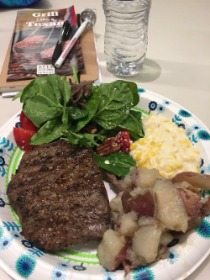
Our opening night we heard from Russell Boening, president of Texas Farm Bureau, who shared more information about the Texas beef and agricultural industries, and Kevin Johnson with Texas Christian University’s Ranch Management Program which teaches young ranchers the business of ranching through classroom instruction and an intensive hands-on experience. Boening and Johnson both shared their passion for this industry and the need to educate others about the beef life cycle including learning more about cow-calf operations, to weaning, to feedyards and stockers, and then to the packing plant. In all areas of this industry there are jobs. And I couldn’t agree more with what Mr. Johnson shared, “We have more jobs than we have kids” in order to “feed the world with high quality protein.”
The next morning we headed to Burgundy Pasture Beef in Grandview, Texas where they started a grass fed beef program when no one else was in 1999. Their 1400 acre ranch has taken time to establish deep rooted native grasses to feed their cattle. Lunch speaker was Dr. Guy Ellis, technical services veterinarian with Merck who practiced veterinary medicine for 17 years before joining Merck where his focus is beef cattle health. I believe it was important for participants to learn how the role of a veterinarian and beef cattle health is important to the food industry.
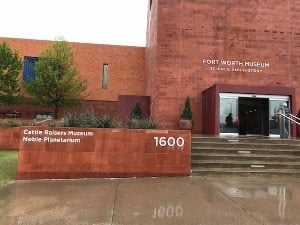
Then we visited the Cattle Raisers Museum in Fort Worth where we learned more about the history of cattle and ranching in Texas. Across the street we visited with Livestock Show Manager, Stefan Marchman, with the Fort Worth Stock Show and Rodeo. He gave us a tour of their large facility where they not only host the Fort Worth Stock Show each year but also host numerous other events at their facility. The Fort Worth Stock Show hosts over 13,000 FFA and 4-H youth alone in their junior shows division. We wrapped up the second evening with a working dinner at River Ranch Stockyards which is near the Fort Worth Stockyards that serves as a historical site of cattle drives from years ago.
Our last day we learned more from the 4-H Extension Agent in Tarrant County, Texas. I was very interested in learning a bit more about how 4-H programs are organized in Texas given my current position as the 4-H Extension Educator in Fairfield County. We then boarded the bus and traveled to Standard Meat in Saginaw, Texas to explore more about meat safety, processing and packaging. Perhaps the most interesting thing from this tour was he amount of technology it takes to process boxed beef down to standard cuts to distribute to restaurants. The machines were incredible yet they discussed how important it is for them to still utilize hard working employees as meat cuts are all different and this helps ensure quality control of their product.
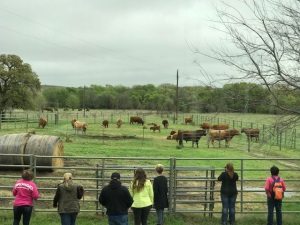
Dr. Ron Gill hosted our group at his ranch to discuss animal behavior and handling. Raising Hereford and Red Angus cattle, he shared more information about how animals are handled and worked affects their growth and productivity and what ranchers can to to minimize stress on the animal. He also shared more information about understanding a cow’s flight zone and how this can be very helpful when working cattle at their ranch. We wrapped up the last evening with Chef Mike Erickson and his work with the True Beef film project and his efforts with his culinary arts program and students. Chef Erickson shared more about how it takes a community to teach all ages of consumers the truths about beef and the cattle industry including teachers, cooks/chefs, meat scientists, farmers/ranchers, business partners, and registered dietitians just to name a few. I could not agree more!
The event in Fort Worth was exciting as was the fact that this particular event took place in the heartland of our nation’s cattle industry. Texas currently is the top beef producing state in the nation and it was interesting for me to observe similarities and differences to the Texas beef industry compared to that which I know about in Ohio. Although they are called are beef farms in Ohio, they are called cattle ranches in Texas regardless of size. One might expect the average ranch in Texas to have hundreds of acres with hundreds of head of cattle – however the average ranch in Texas is only 40 head.
The American Farm Bureau Foundation for Agriculture, Texas Farm Bureau, and Texas Beef Council shared with participants many opportunities to engage using curriculum that has already been created by their organizations to help educate our consumers of tomorrow. I believe seeing some of the beef operations and businesses in action during this event helped all educators better understand those connections from farm to dinner plate. Additionally, educators learned about different organizations that also exist in their home states and communities that would be great relationships and partners to help educate their students about agriculture including Extension programs, state and local County Farm Bureau organizations, Ag in the Classroom programs, and agricultural commodity organizations.
I would highly recommend formal and non-formal educators to apply to be considered as a participant in this program in the future! There is always more for us all to learn about this industry and it’s imperative to do so as we work toward feeding a growing population. Public school teachers participating in this program shared that there is not enough agricultural education in public schools and how easy it is for them to see how agriculture fits in with STEM concepts – nutrient cycles, food webs, scientific laws, technology, mapping average for the productivity and sustainability of ranch operations and more!


The guide includes a farm driver checklist, overview of state and federal regulations and exemptions, CDL qualifications and more.
Read More


The emergency fuel waiver to allow the sale of summer gasoline blends containing 15% ethanol will lengthen the period during which Americans can continue buying E15 from June 1 to Sept. 15.
Read More

The Small-Scale Food Business Guide covers federal and state regulations for selling food products such as raw meat, dairy, eggs, baked goods, cottage foods, fruits and vegetables, honey and more.
Read More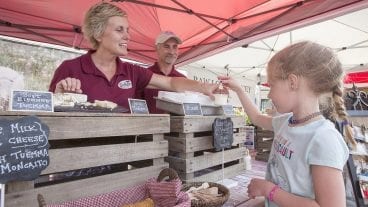
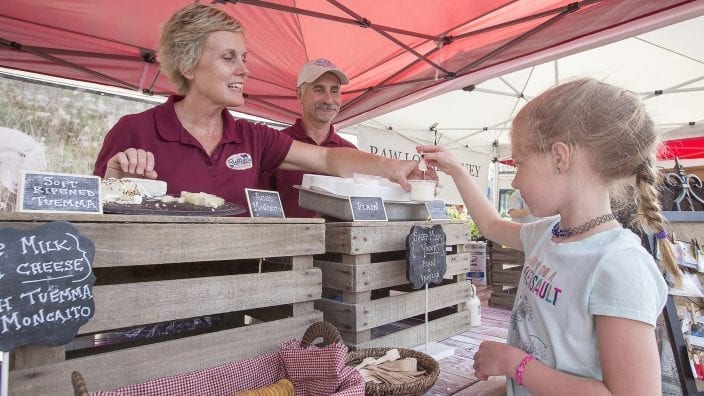
New resources and technology are broadening the different types of sales tools and strategies available to farmers.
Read More

ODA will enroll 500,000 acres into the program for a two-week sign-up period, beginning April 22, 2024, through May 6, 2024. Contact local SWCD offices to apply.
Read More

Katie Share of Columbus has been named ExploreAg and Youth Development Specialist for Ohio Farm Bureau.
Read More

Mary Klopfenstein of Delphos has been named Young Ag Professional and Ag Literacy Program Specialist for Ohio Farm Bureau.
Read More

The plan has been updated to give sole proprietors access to more rate stability and a smart solution that offers potential savings on health care.
Read More

The American Farm Bureau Federation, in partnership with Farm Credit, is seeking entrepreneurs to apply online by June 15 for the 2025 Farm Bureau Ag Innovation Challenge.
Read More

Adele Flynn of Wellington has been elected treasurer of the Ohio Farm Bureau Federation and now holds the third highest elected office in Ohio’s largest and most influential farm organization.
Read More